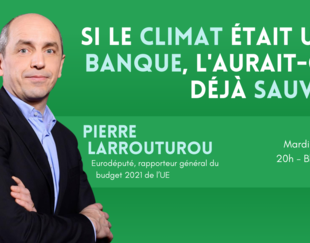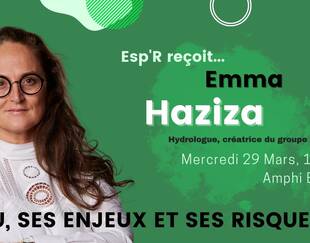Planetary boundaries: learning from our mistakes to build a better economy
In line with the reform of its curriculum focusing on ecological transition and societal challenges, HEC Paris maximizes its master's students' awareness about climate change and the impact of its social- and societally related transformations on the economy. To illustrate this fundamental pedagogical action towards a more responsible economy and potential acts for a better future, François Gemenne, an IPCC expert, teaches a compulsory course at HEC entitled “Planetary Boundaries".

© Petmal
Auteur/Author of this article: Frédéric Voirin
There is currently a 66% probability that our planet’s temperature rises by 1.5 degree Celsius within five years according to the European Copernicus Climate Center. This situation will have consequences not only for the climate, but also for our economies, for people, for the cohesion of our societies, and for biodiversity.
Facing this kind of environmental pressure, HEC Paris has decided to reform its academic curriculum with the integration of ecological transition, climate change and societal challenges, by adding a new course named “Planetary Boundaries”.
Originally initiated in 2021 by the HEC Paris Sustainability & Organization Institute as part of the Purpose and Sustainability program, this academic content evolved in 2023 to become a mandatory class for all L3 students of HEC Paris. Let’s discover why and what it consists of.
A course led by an expert from the IPCC (GIEC)
In September 2023, HEC Paris welcomed François Gemenne to its professorial corps. Gemenne is a political scientist, specialist of environmental geopolitics and lead author of the IPCC (Intergovernmental Panel on Climate Change, known as GIEC in French). As professor of economics and decision sciences, Gemenne has taken over the direction of the specialized master's program in Sustainability and Social Innovation (SASI) and coordinates the mandatory course "Planetary Boundaries" for HEC's first-year students.
Gemenne says that his vision at HEC Paris is “to help transform companies and adapt them towards the low-carbon economy because," he says, "I’m convinced that it will be the economy of the 21st century”.
“I’m convinced that low-carbon economy will be the economy of the 21st century”
A 30-hour course to master the fundamentals of our planetary boundaries
This 30-hour course represents the foundational teaching of the school regarding planetary boundaries and how they should be integrated into our economic activity. It also intersects with the social aspects and political foundations of business, addressing questions such as inequalities and migrations.
This course is mandatory for all first year L3 students, representing approximately 400 newcomers this year. Indeed, from the very beginning of the year, HEC students are sensitized to planetary boundaries, as illustrated by this back-to-school conference on climate and migrations also led by Professor Gemenne.
“From the very beginning of the year, HEC Students are sensitized to planetary boundaries”
Explaining the concept of anthropocene to young generations…
The first part of this course addresses the different dimensions of the Anthropocene. This word was first proposed and popularized by the Dutch meteorologist and winner of the 1995 Nobel Prize in Chemistry Paul Crutzen, who suggested that the emission of industrial gases accelerate the thinning of the ozone layer at the poles.
Many geologists believe that humans have altered the earth so much since the start of the industrial revolution that we are now living in a new epoch called the Anthropocene. This Anthropocene now describes the most recent period in the earth's history, when human activities have a very important effect on the earth's environment and climate, i.e weather conditions.
In his course, François Gemenne insistst that the Anthropocene combines “what we call the environmental crisis, climate change, biodiversity, the exploitation of rare materials and limited resources”.
“The Anthropocene combines what we call the environmental crisis, climate change, biodiversity, the exploitation of rare materials and limited resources”
These changes are analyzed with students to help them have “some of the key knowledge that they will use in their other courses such as marketing, supply chain or strategy: it will make them understand that all the traditional topics studied at HEC will be affected by these environmental changes”, says Gemenne.
“We want students to understand that all the traditional topics studied at HEC will be affected by these environmental changes”
…To maximize the wake-up call and act for a better economy
The second part of the course covers traditional topics studied at HEC Paris, such as law, supply chain or finance. It shows how these fields will also be transformed by the ecological crisis.
Indeed, according to a 2023-report by the European Central Bank on the impact of climate on the economy : “Climate change will cause income divergence across individuals, sectors, and regions, adjustment in energy markets, increased inflation variability, financial markets stress, intensified innovation, increased migration, and rising public debt.”
By the end of the course, Gemenne expects the students “to realize how much economic activity will be affected by environmental changes”. He also believes that biodiversity loss, climate change or exhaustion of resources are not just an issue for ecosystems or the environment. "It is also a pressing issue for companies, and they need to deal with them too.”
“Biodiversity loss, climate change or exhaustion of resources are not just an issue for ecosystems, it is a pressing issue for companies, and they need to deal with them too”
Gemenne concludes : “We need to realize that for a long time, we’ve been completely blind to the environmental impacts of industrial and economic activities. At present, this can no longer be the case”. In other words, our future economic and political leaders need to be aware of these growing challenges to make sure they propose fct-based solutions.
Watch HEC Professor François Gemenne’s Conference about Climate & Migrations:
Related articles


